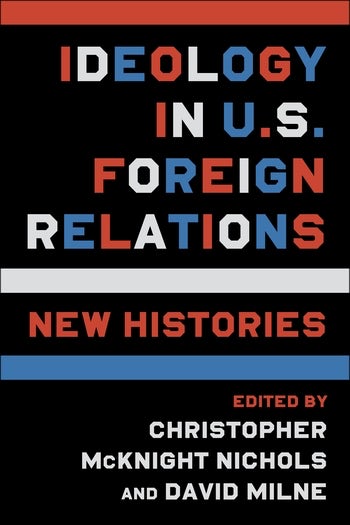David Milne

Ideology in US Foreign Relations

Reviews
"A dream team of historians of U.S. foreign relations, under the masterly guidance of Christopher McKnight Nichols and David Milne, has rehabilitated the concept of ideology for a new historiographical moment. The results are indispensable: each of the parts is superb,
and the whole is more than their sum."
Samuel Moyn, author of Not Enough: Human Rights in an Unequal World
"This is a timely and vital collection filled with brilliant insights on the often unacknowledged influence of ideology on American foreign policy. By moving far beyond a traditional framing of diplomatic history, the essays powerfully demonstrate how ideology shapes the interplay
between domestic and global affairs."
Keisha N. Blain, author of Until I Am Free: Fannie Lou Hamer’s Enduring Message to America
This edited collection centers ideology as a core analytical tool to explain the history and present of U.S. foreign relations. Oftentimes hard to discern or even hidden, ideologies plan and rationalize, and represent, actual policy. This is a huge undertaking and offers highly original and compelling work.
Thomas Zeiler, coauthor of Globalization and the American Century
This ambitious book persuasively makes the case that historians of U.S. foreign relations/America in the world should devote more attention to ideologies and the roles ideology has played in U.S. behavior, U.S. foreign policies, and the ways Americans have understood themselves, their nation, and their role in the world. There is no book quite like this one in the field of U.S. foreign relations history. This volume will inspire new scholarship for years to come.
Kelly J. Shannon, author of U.S. Foreign Policy and Muslim Women's Human Rights
This wonderfully expansive collection comes at a moment when understanding the central role ideas play in the making of American foreign relations has never been more important. It offers powerful genealogies for today’s authoritarian challenges to democratic norms,rising waves of white supremacy, and the deglobalization of the world economy.
Mark Philip Bradley, editor of American Historical Review
This expansive collection shows the work of a broad diversity of ideas and voices in U.S. foreign relations history, featuring not only presidents and diplomats, but also indigenous peoples, grassroots activists, and even children. This field-expanding book will have an
enduring impact on teaching and writing in foreign relations history.
Mary Dudziak, author of War Time: An Idea, Its History, Its Consequences